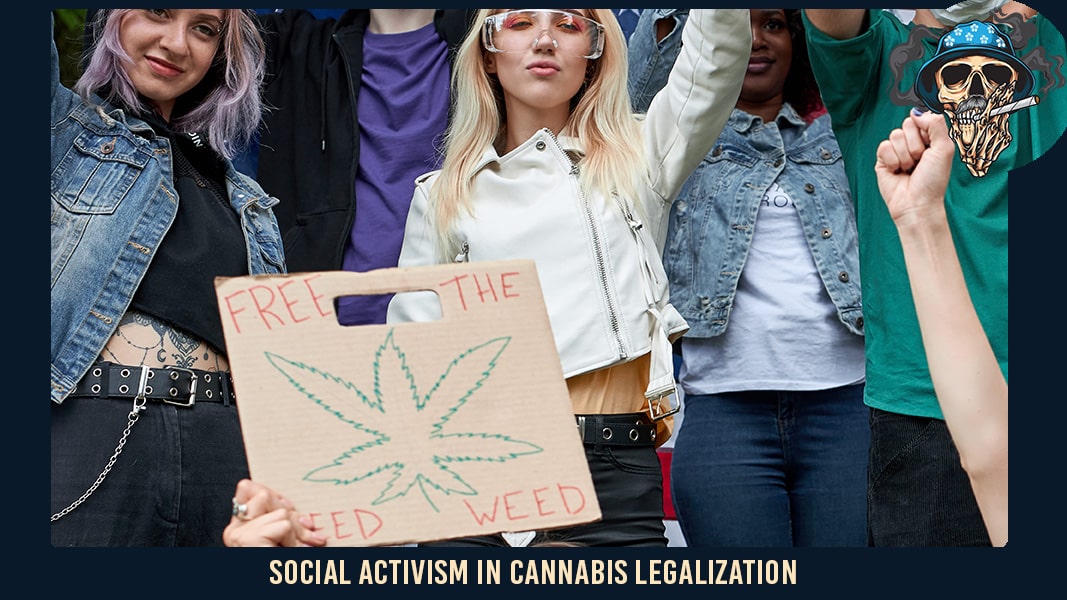Community and Social Activism in Cannabis Legalization and Harm Reduction
The Blossoming Role of Community and Social Activism in Cannabis Legalization and Harm Reduction
As the green wave of cannabis legalization sweeps across various regions globally, the intersection of community involvement and social activism becomes increasingly crucial. This phenomenon is not just about promoting the use of cannabis but also about advocating for fair policies, educating the public on safe practices, and ensuring the benefits of legalization extend throughout society. Here, we explore how communities are shaping the future of cannabis through passionate activism and informed advocacy.
Grassroots Movements Fuel Change
At the heart of cannabis legalization are grassroots organizations that mobilize support and educate the public about its benefits. These groups are pivotal in changing perceptions and pushing for legislative reform. From small community gatherings to large-scale rallies, activists are making their voices heard.
Case Studies of Success
For instance, organizations like NORML (National Organization for the Reform of Marijuana Laws) have been instrumental in the cannabis legalization movement in the United States for over 50 years. As a pioneering advocacy group, NORML has focused on providing research-based information and lobbying lawmakers to support cannabis reform. Their efforts have contributed to changing laws in numerous states, advocating for the decriminalization of marijuana and the establishment of medical marijuana programs. Their extensive resources for consumers and policymakers, accessed through NORML’s official website, underscore their commitment to informed public discourse and policy change.
Another notable organization in this space is the Marijuana Policy Project (MPP), pivotal in orchestrating some of the most significant legalization campaigns nationwide. Founded in 1995, MPP has been a leader in the marijuana reform movement, focusing on removing criminal penalties for marijuana use and developing regulated markets. MPP’s strategic approach to influencing state and federal laws is well-documented in their successful campaigns, such as those in Nevada and Massachusetts, where comprehensive marijuana legalization measures were passed. More about their strategies and successes can be explored on MPP’s official website.
These organizations demonstrate the power of well-coordinated advocacy efforts in shaping public policy and fostering a more rational and scientific approach to cannabis legislation. Their successes highlight the importance of sustained advocacy and education in achieving policy goals.
Education as a Tool for Empowerment
One of the primary roles of community activists in the cannabis space is education. Misinformation about cannabis is rampant, and part of the activism journey is correcting false narratives and educating people on the facts.
Comprehensive Cannabis Education
Educational initiatives cover various aspects:
- Health Benefits: Dispelling myths and providing evidence-based information on the medical benefits of cannabis.
- Safety Practices: Teaching consumers about safe consumption methods and the importance of dosage control.
- Legal Rights: Informing the public about their legal rights regarding cannabis use and possession.
For example, the Drug Policy Alliance offers extensive resources and training sessions on drug policy and harm reduction, emphasizing the need for a health-focused approach to drug use.
Advocacy for Fair Policies
Cannabis legalization is intricately tied to broader social justice issues, particularly concerning the expungement of previous convictions. The War on Drugs has disproportionately affected marginalized communities, leaving a legacy of inequity that activists are now striving to address. Organizations like the Last Prisoner Project focus on rectifying these injustices by working to release individuals incarcerated for cannabis offenses and helping to clear their records. Their advocacy highlights the need for comprehensive legal reforms that not only legalize cannabis but also repair the harms caused by its prohibition. More about their mission and impact can be found on Last Prisoner Project’s website.
Moreover, groups such as the Drug Policy Alliance (DPA) push for a complete overhaul of drug laws to prioritize health and equity over punitive measures. The DPA advocates for policies that reduce the harms of both drug use and drug prohibition, such as decriminalization and the establishment of safe consumption sites. Their work emphasizes the importance of a harm-reduction approach and the need for policies that support the wellbeing of all individuals, especially those from communities historically targeted by drug enforcement. Information on their initiatives and how they are leading the change can be explored through Drug Policy Alliance’s website.
These activist efforts are crucial in ensuring that cannabis legalization does not perpetuate past injustices but instead lays the groundwork for a fair and equitable legal landscape. Their work in changing laws and public perceptions is vital to creating an inclusive approach to cannabis policy that acknowledges and addresses historical disparities.
Justice in Legislation
A significant aspect of this advocacy is the push for laws that retroactively address the disparities caused by previous cannabis prohibitions. Organizations such as the Last Prisoner Project work tirelessly to free those incarcerated for cannabis offenses that are no longer illegal and to help them reintegrate into society.
Economic Empowerment Through Legalization
Legalization isn’t just a legal issue—it’s also an economic one. Activists push for regulations that allow small businesses to thrive alongside large corporations and for minority-owned businesses to receive support.
Building an Inclusive Industry
Community leaders advocate for economic programs that support cannabis entrepreneurship among underrepresented groups. For instance, some states have implemented licensing programs designed to benefit local and minority-owned businesses, ensuring the economic benefits of legalization are widely distributed.
Reducing Harm Through Scientific Research
Harm reduction is a crucial component of cannabis activism. By supporting scientific research and promoting data-driven policies, activists help ensure that cannabis legalization prioritizes public health.
Research and Public Health
Recent studies underscore the necessity of integrating public health frameworks into cannabis policy to ensure that legalization efforts benefit public health and safety. Organizations such as the American Public Health Association (APHA) have been pivotal in this discourse, advocating for policies prioritizing health and safety over punitive approaches. The APHA has published numerous position papers and research findings that stress the importance of basing cannabis legislation on sound public health principles. One of their key publications can be found on their official policy statement page, which elaborates on their stance that cannabis policies should aim to reduce consumption, limit health disparities, and educate the public about the risks and benefits of cannabis use.
Furthermore, academic research plays a crucial role in shaping effective cannabis policy. Studies such as those published in the Journal of Public Health Policy offer insight into the long-term effects of cannabis use and the effectiveness of various regulatory frameworks. These studies are critical for informing policy that can adeptly mitigate risks associated with cannabis use, such as dependency and impaired driving, while harnessing its therapeutic potential.
The call for ongoing research is echoed by institutions like the National Institute on Drug Abuse (NIDA), which regularly updates its findings on cannabis, addressing both the harmful effects and potential medical benefits. NIDA’s comprehensive research provides a balanced view that is essential for policymakers, helping ensure that cannabis regulation is responsive to the latest scientific understanding. Details on their ongoing research and publications can be accessed through NIDA’s cannabis research page.
Overcoming Challenges with Collective Action
While there is significant progress in cannabis legalization and harm reduction, challenges remain, such as federal illegality in the U.S. and international drug treaties that complicate policy changes. Activists often collaborate across borders to share strategies and successes, strengthening their global impact.
International Efforts in Activism
Global forums and conferences, like those organized by the International Drug Policy Consortium, provide platforms for activists to learn from each other and unify their efforts. These events highlight the global nature of drug policy reform and the importance of international solidarity.
The Future of Cannabis Activism
Looking forward, the role of community and social activism in cannabis legalization appears more vital than ever. As new territories consider legalization, the lessons learned from current movements will guide future efforts. Continued activism, education, and advocacy are essential to ensure that cannabis legalization remains thoughtful, equitable, and beneficial for all.
The ongoing efforts of countless activists and organizations demonstrate a powerful commitment to changing laws and transforming societal attitudes toward cannabis. Through community engagement and persistent advocacy, the path toward comprehensive cannabis reform seems increasingly hopeful.
The synergy between community involvement and social activism creates a dynamic force driving the cannabis legalization and harm reduction landscapes. It’s a testament to the power of informed, passionate advocacy in shaping public policy and societal norms, ensuring that the benefits of cannabis reform are realized across all layers of society.


